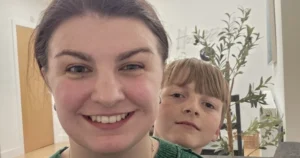Sharing how she supports her tween and teens, Sarah mum of 3 shares her relaxed approach to screen time and some basic rules she follows to guide them in the right direction
“Honestly, it feels like a losing battle, especially with Archie, who’s 14,” Sarah says. “I’m not entirely sure we DO manage screen time.”
Maintaining screen time rules
When the children were a little younger, Sarah and her husband had rules around screen time. As they got older, the rules were relaxed a little, and then a little more. “They have now pretty much gone out of the window! Until recently, Archie would turn off his devices at 9.30pm on a school night, but that started slipping so I changed the rules to 10 pm. He still breaks that rule most nights though,” she admits.
Overall, the children’s screen time is based on their age, and how much sleep they need. “My 12-year-old needs more sleep than her brothers, so she has to switch off earlier,” Sarah says. “My 17-year-old goes to bed long after me, and will be on his phone right up until he goes to bed.”
Online risks are not a worry
Sarah admits doesn’t worry about what they’re doing online. Most of the activity is watching videos or chatting with friends, which Sarah considers harmless. “Sometimes they’ll surprise me because they’re watching quite geeky science videos or news videos on Snapchat. I just wish they’d spend less time doing it!” she says.
In a world where online activity is often seen as very risky for young people, Sarah says she doesn’t really worry. “They’re sensible kids and know what they should and shouldn’t be doing. Their accounts are private, and they’re only interacting with people they know.”
Relaxed approached to parental controls
Unsurprisingly then, Sarah doesn’t use any parental monitoring software. “It may be stupid but I trust them,” she says. “Nobody ever closes a door in our house, so I can always look over their shoulders and see what they’re looking at.”
Simple online safety conversations
The family also skips long chats about online safety. “It’s not easy to have a conversation with a teenage boy if they don’t want to have a conversation,” says Sarah. “I don’t want to create conflict unnecessarily.” Instead, Sarah will keep conversations light, and might occasionally ask the children what they’re watching. “They might say ‘nothing’ but it shows them I’m interested and not giving them a completely free rein.”
For parents with teens, Sarah’s advice is to keep rules simple. “Have a shut down time at night, and make it different for school and non-school nights. Adapt those rules as children get older. It’s important to show you respect their maturity.”
As for parents with younger children, Sarah advises them not to judge until they too have teens. “If parents of younger children are reading this and frowning, thinking they won’t be like this when their kids are teenagers, good luck! Because it really will get like that.”

Sarah is a mum of three, who works full-time. She is currently facing the challenge of managing screen time with her children, aged 12, 14 and 17.






